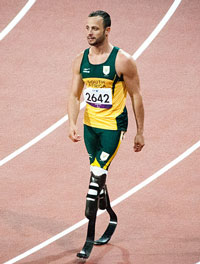
News media are gearing up in the way they did for Nelson Mandela's funeral, with big plans, budgets and teams. It is an opportunity for outlets and journalists to capture audience, as shown by how reporters tweeting from the court in previous Pistorius appearances saw their followers multiply. In the rush for fresh angles on a story with saturation coverage, the paper-thin distinction between serious and entertainment media will fade away. Metaphors will be exploited more than a Marikana mineworker will. Journalistic ethics will be stretched like the road rules for a minibus-taxi driver.
We will have our first pop-up TV channel, with MultiChoice creating a 24-hour pay channel just for the trial. This will compete with all the local and international live news channels, in a blur of acronyms: eNCA, SABC News, ANN7, CNN, BBC...
The nation will be drawn together around our TVs to follow every step of the trial in a way that happens only occasionally for big events.
Unlike Mandela's funeral, though, which pulled South Africans together in a way we had not seen for 20 years, this event is likely to be hotly disputed, exposing our underbelly of racially charged privilege, gender violence and gun-toting insecurity. It will probably be more interesting than the elections, the next big set-piece media event, because the outcome in the Pistorius trial is not known.
Pistorius will be in the dock, but our justice system will be on trial.
One thing is clear, though: what you will see is not the regular justice system. It is one in which each side is on its best behaviour under international scrutiny. Millions are being spent. Reputations will be made and broken. Anyone who has had the pleasure of a morning in the local magistrate's court will know that this is not how it happens for ordinary people caught in a shabby system where most accused are scared and vulnerable, the prosecutor overworked and under-prepared and the bench irascible.
The media will turn it from a murder trial into a spectacle. It is a dream, once-in-a-lifetime narrative: a disabled but photogenic accused admired for his athletic bravado, a beautiful and loved victim, her penniless parents watching helplessly, an arsenal of guns, garages full of fast cars, and a tale of twisted love that went wrong on Valentine's Day.
If you pitched this for a soap opera, it would be rejected as too far-fetched.
In principle, an open court with full media coverage is a good thing, opening the system to scrutiny and informing a whole lot of people about how it works or should work. It is probably harder to lie when the whole world is watching.
But in a case like this, cameras can distort the process. It is not these celebrity trials that need the media coverage, it is the scared, lonely mother in the local court accused of stealing bread for a hungry child and who cannot afford the R100 bail.
If we could dedicate a channel to these cases, justice would be served.
Twitter will ensure that public sentiment swings wildly with every bit of evidence. Instead of having journalists explain the complicated flow of a court case, there will be instant reaction to everything said: untested allegations, disputed evidence and dodgy witnesses. Twitter is not a reliable medium to capture the complex workings of justice.
To understand a case like this, it is worth remembering that this is not really about the pursuit of truth. It is the pursuit of a conviction "without reasonable doubt" in an adversarial system. The defence has to cast enough doubt on the evidence to make it unreliable; the prosecutor has to stop them poking too many holes in his story. A great deal depends on how well the police have conducted the investigation. One slip can mean that the accused gets off, even if everyone knows he is guilty.
The court still has to decide what to allow in the courtroom, and to set rules of conduct for the media. I hope they keep it open, but with firm and clear rules in the interests of justice.
